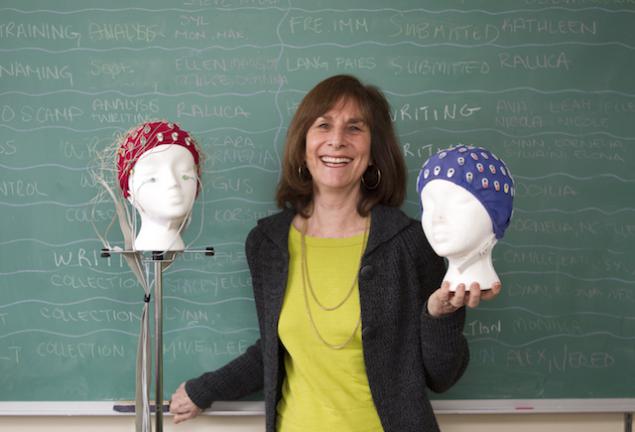819
How learn 30 languages: the secret polyglots
Become inostrantsemNekotorym people manage to learn such an incredible number of languages that the head does not fit as is possible. BBC Future attempted to find out from their secret multilingvistov.
Out on the sunny balcony, Tim Kelly and Daniel Krasa scribbling words into each other as the gunfire: German, Hindi, Nepali, Croatian, Mandarin, Thai - barely have time to finish a phrase in one language is switched to another. These two know of at least two dozen different languages.

watch them, I go back to the hall, where small groups of people, like the one couple, pop tirelessly to obscure dialects. We are on polyglots Congress in Berlin, where about 350 people gathered to chat on a variety of the planet's languages: the language of the Sami to reindeer herders in Scandinavia. Some of the audience - "gipergloty": they know at least a dozen languages. One of the most skilled linguists, met here knows about thirty.
The human brain uses several different methods of memorization and studying the language they use all. Procedural memory is responsible for the movements of the tongue when pronouncing sounds, declarative memory writes new words. If you do not want to sound like a stuttering robot, you'll need to bring sustained phrases and expressions in the "explicit" and "implicit" memory.
Language similar to intensive sports training: it is difficult, but it is - the most effective way to "pump" the brain. Numerous studies have convincingly demonstrated the benefits of linguistic load: improving attention, memory expands "cognitive reserve", delaying the onset of age-dementia. Studying the experience of immigrants, Ellen Belistok found that dementia in bilingual (people good bilingual) occurs, on average, five years later. The more languages you know, the better the brain will work.

Until recently, neuroscientists reigned skepticism among most people fail to achieve fluency in a speech in a foreign language, since there is a fairly narrow age window - childhood - for learning languages, they argued. So, if you are over eighteen - everything, "the train has left." However, in our time gradually debunked this myth, thanks to the new data obtained by researchers. "Age-related decline in the ability to learn languages like a smooth descent, and not on a steep cliff" - says Belistok.
«The age decreased ability to learn languages like a smooth descent, and not on a steep cliff» h4> And this is true: most giperglotov, I have met in Berlin mastered the language much later, than in childhood. Kili grew up in Florida, where he studied Spanish in school. As a child he loved to listen to foreign radio stations - despite the fact that he could not understand a word. "Foreign it sounded like music to my ears" - he recalls. But only when Keeley rose and began traveling, learning languages really fascinated him. He studied French, German and Portuguese in college in Columbia, then moved to Switzerland, then - in Eastern Europe, where later went to Japan. Now Kiely is fluent in twenty languages and almost all he learned in adulthood. "This is your hypothesis about language and age - bullshit!" - He says.
Out on the sunny balcony, Tim Kelly and Daniel Krasa scribbling words into each other as the gunfire: German, Hindi, Nepali, Croatian, Mandarin, Thai - barely have time to finish a phrase in one language is switched to another. These two know of at least two dozen different languages.

watch them, I go back to the hall, where small groups of people, like the one couple, pop tirelessly to obscure dialects. We are on polyglots Congress in Berlin, where about 350 people gathered to chat on a variety of the planet's languages: the language of the Sami to reindeer herders in Scandinavia. Some of the audience - "gipergloty": they know at least a dozen languages. One of the most skilled linguists, met here knows about thirty.
The human brain uses several different methods of memorization and studying the language they use all. Procedural memory is responsible for the movements of the tongue when pronouncing sounds, declarative memory writes new words. If you do not want to sound like a stuttering robot, you'll need to bring sustained phrases and expressions in the "explicit" and "implicit" memory.
Language similar to intensive sports training: it is difficult, but it is - the most effective way to "pump" the brain. Numerous studies have convincingly demonstrated the benefits of linguistic load: improving attention, memory expands "cognitive reserve", delaying the onset of age-dementia. Studying the experience of immigrants, Ellen Belistok found that dementia in bilingual (people good bilingual) occurs, on average, five years later. The more languages you know, the better the brain will work.

Until recently, neuroscientists reigned skepticism among most people fail to achieve fluency in a speech in a foreign language, since there is a fairly narrow age window - childhood - for learning languages, they argued. So, if you are over eighteen - everything, "the train has left." However, in our time gradually debunked this myth, thanks to the new data obtained by researchers. "Age-related decline in the ability to learn languages like a smooth descent, and not on a steep cliff" - says Belistok.
«The age decreased ability to learn languages like a smooth descent, and not on a steep cliff» h4> And this is true: most giperglotov, I have met in Berlin mastered the language much later, than in childhood. Kili grew up in Florida, where he studied Spanish in school. As a child he loved to listen to foreign radio stations - despite the fact that he could not understand a word. "Foreign it sounded like music to my ears" - he recalls. But only when Keeley rose and began traveling, learning languages really fascinated him. He studied French, German and Portuguese in college in Columbia, then moved to Switzerland, then - in Eastern Europe, where later went to Japan. Now Kiely is fluent in twenty languages and almost all he learned in adulthood. "This is your hypothesis about language and age - bullshit!" - He says.
Cultural hameleonyNo whether the ability to multilingvistike feature peculiar to a few people? Or maybe they have more motivation? "Rather than focus on intelligence, try to look into the depths of his personality - advises Keeley, who is currently working on a book about the social, psychological and emotional aspects of learning languages - Top multilingvy - those who are able to try on someone else's identity . Try to be "a cultural chameleon" and become a representative of the people whose language you want to learn ».
Psychologists have long known that the words uttered by us, tightly woven into the essence of the person. Of course, we're not talking about clichés (unlikely French will make you more romantic and Italian - passionate), but each language is associated with the cultural norms of their vehicles, which can not but affect the target language. Studies have shown that speaking in another language, we have automatically "try on" the behavior of the people for whom the language - native.
Vladimir Nabokov wrote in his autobiography (in English): "My memory is configured as music, in the same way with Russia, but is forced to sound in a different key, the English." When Nabokov translated these memoirs into the language of his childhood, he discovered that the Russian discovered new facets of his reflections and memories described in other words, played different colors. "The Russian version was like a different feel for what the English - says Aneta Pavlenko from Temple University in Philadelphia, whose book," Dvuyazyny mind ", explores the many similar examples. - As if the Russian and English brought with them different versions of the past ».

Kiely, professor of cross-cultural management at the University Sangyo in Japan recently conducted a survey among Chinese carriers wishing to learn Japanese in order to check their "ego-permeability". The questions in the test were approximately as follows: "It is easy whether you put yourself in the other person and feel what he feels?" Or "Can you infect the emotions of other people?" As Keeley suspected, the best in language learning students showed the most good results in this test. Why? .. It is well known that when you communicate with someone, you unconsciously seek to mimic the behavior of the interlocutor (and it too) - is an evolutionary mechanism of nonverbal communication. However, the identity, language and culture impede this process. We do not want to imitate, we strive to preserve their identity. And it prevents the construction of new neural pathways - highways, for which "non-native" words and phrases running to the tip of the language in the speech. For each language that you are trying to learn such ways are built separately to languages and associated cultural characteristics are not mixed with each other. "It does not really matter how much time you sat over textbooks. It all depends on how fast your brain will be able to build these highways. Closing of the influence of someone else's identity, you are strongly inhibits this process "- says Kiely. Perhaps this explains the ease with which he switches from one language to another.
Michael Levi Harris can explain this principle is best, because it is a polyglot who owns a dozen languages, and at the same time - an actor. A native of New York, Michael worked out with the proud British accent. When he moves from one language to another, as if it turns into another person. "I do not try to consciously change the behavior - says Harris - it just happens, and everything. But I understand what changes ».
Michael is convinced that anyone can learn how to put on and reset the "cultural envelope" without too much difficulty. He gives a few tips from his acting practice. "Everyone can listen and repeat, nothing difficult about it. You may notice a subconscious desire for imitation, but rather than suppress it, try to concentrate on it. As a stage actor, he does everything a little exaggerated, since body language affects thinking. If you cheat a little lip, then you feel a little French ».
It is also important to overcome the confusion that arises when pronouncing alien your language sounds (such as [r], [th] in English - approx. Translation.) You'll stumble on them up until not make myself believe that these Sounds estesstvenno for "your" yazvka, that is not yet certain that this language - your ».

Most respondents bilingual I agree that we should not set ourselves very ambitious targets. "The problem is that people who want to learn a foreign overstate the bar. They think that their goal - to speak a foreign language perfectly as well, as a mother, while all that is needed - this is just to learn how to express their thoughts. " "Practice as often as possible - advises Alex Rawlings, who conducts multilingual workshops with a colleague - This can be compared to weight training. Even if you are too tired to sustain a full lesson 15 minutes, you always will find: look any transfer or listen to songs in the target language you ».
Before I met "giperglotami" I think that the study of a large number of foreign languages - the inheritance possessed. In fact, why take on such hard work, if you do not go astray? But all the people I met were not like the crazies: they are full of enthusiasm and always welcome the opportunity to talk and make friends. Their example shows that we must work not only on grammar and verbal time, but also on themselves. "Overcoming barriers - that is what is really difficult - says Harris - When I was living in Dubai, I was experiencing some discomfort, as a Jew in an Arab country. But I found a friend, a wonderful person, a native of Lebanon. And when I was preparing for the move, he said that I was one of the most important people in his life! Learning another language opens up new worlds ».
via www.bbc.com/future/story/20150528-how-to-learn-30-languages
10 most interesting catacombs of the world, which certainly need to go down
What will happen with a bullet, if you shoot in the ice

























